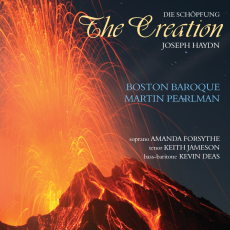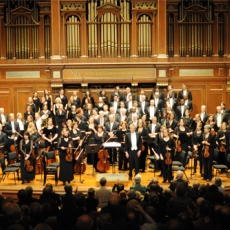Boston Baroque - Haydn Creation - Classical Music Sentinel
The beauty of this new recording of Joseph Haydn's The Creation (Die Schöpfung) lies in its unfeathered simplicity. The impact of the performance stems from its "let the music speak for itself" approach. Plain and simple. When compared to other recent versions (René Jacobs and the Freiburger Barockorchester on Harmonia Mundi from 2009 for example), who tried so hard to be "authentic" on the one hand, and yet attempted to move Haydn up a century or two expressively on the other, and in the process rendered the music abrasive and unbearable to listen to, this performance with the Boston Baroque orchestra under the direction of Martin Pearlman is a delightful listening experience. The tempos are generally more relaxed, more congenial to the written score, and allow both the musicians and singers to better project the meaning of the text. Soprano Amanda Forsythe, tenor Keith Jameson and bass-baritone Kevin Deas, dispense with all manner of operatic delivery, focusing instead on beauty of tone and fluid lines. Duets in particular are distinguished by an effortless flow, almost dance-like, character. The 25 strong choir is in precise proportion to the overall forces, and the recording's perspective has it coming from the back, as it should.
Back in the late 18th century, music had not yet evolved to the point where it could convincingly describe, or express, matters beyond its own realm. Therefore, Joseph Haydn's efforts to exemplify or depict a subject as lofty as the creation, albeit as a grand oratorio, fell short of the mark and were considered naïve. Although his use of strictly lower pitched stringed instruments to depict the depths of the sea is quite effective. Some critics at the time even went so far as to describe it as a "childish painting" of nature. Add to this religious considerations and constant comparisons to the great Handel oratorios, and you can see how Haydn's work may have had difficulty getting off the ground. Nevertheless, in strictly musical terms, it certainly was quite an achievement for its time, bearing the influence of Mozart, and providing plenty of musical fodder for Beethoven. And despite being laid-out over 32 short episodes, it stands up well as a whole. Martin Pearlman's unaffected and genuine overview of this important classical vocal work, places it in its proper historical time frame, and dresses it up in refined classical garments. As always, Linn Records provide a peerless recording capturing the sound in the hall's natural acoustics.

